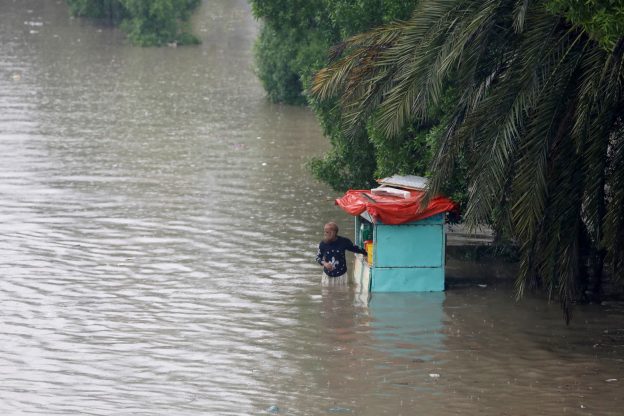Karachi’s partial flooding has been a regular feature over the last few years but the situation this monsoon prevailed for the first time at least in almost 100 years.
This seems to be the very first point for the engineers and city planners that the new approach towards the development of the city must be inclusive in real terms.
Heaviest rains in almost a century, inundating several neighborhoods and trapping thousands of people in low-lying slums with complete cut off from power supply and all means of communication was something unprecedented. It was a catastrophe for sure.
Several development experts believe it was impossible for the current dispensation—at the center, the province, or local levels—to face such a challenge. The reasons that they put forth are (a) the quantum of rains, lack of capacity to handle the situation, faulty engineering, lack of planning, and bad governance.
Many senior engineers in the city have no doubts that it was a huge engineering failure that needs a comprehensive thought process to put things on the right track. For example, all the waterways were not only clear of the obstructions but also they were choked by the solid waste whose management has been an issue and stands far from being addressed. Therefore, most of the localities in the city’s low-lying areas were flooded. This shows a serious breach of planning and also the level of engineering.
‘Ironically, the solid waste management has been taken over by politics and no one cares asking what happened to the projects designed to address the issue,’ Says Fazlullah Qureshi, a senior retired planner.
Yet another senior engineer Engr Sohail Bashir, leading the Institution of Engineers Pakistan (IEP) says the Karachi situation was an engineering failure that exposed a lack of planning and design.
He is of the view that the management of solid waste is one of the major issues without which the rainwater could never be flushed out as this waste has choked drainage of each and every area of the city. ‘Handling this issue is a must, he says.
IEP, Karachi is now planning to organize a moot on engineering solution of Karachi, says Engr Sohail Bashir. He and many his fellow engineers and planners have long been indicating that Karachi has serious planning issues and affairs have been managed on adhocism.
But is it enough to address the issue? Maybe not, as there are many studies that Engr Bashir believes should be carried out. For instance, he says there has never been any hydraulic study of the city so that we know the topography and its features.
He says that addressing Karachi’s issues needs a new approach as the traditional approach would not work anymore.
Have a look at Naya Nazmimabad and the area near Yousuf Goth, he refers where the traditional approach created huge problems during rains.
But the question is if any new approach is being adopted by the ruling circles? It does not seem so from the decisions taken by Prime Minister Imran Khan during his Karachi visit after the floods. It only admitted that Karachi cannot be handled with the ongoing approach in which there is no nucleus in the city.
The prime minister announced an ambitious Rs1.1 trillion package for the development of the city and also set up a coordination and implementation committee led by Sindh Chief Minister Syed Murad Ali Shah.
This committee will bring all stakeholders and authorities together to make key decisions, remove hurdles, and ensure their implementation.
First about the funds. Prime Minister Khan says it would be contributed by both the federal and provincial governments. There is no mention of the ratio of federal contribution. However, the Sindh government says it will contribute Rs800 billion. It means Rs313 billion will come from the federal government.
The numbers and their origin show there is nothing new about the plan as the Sindh government had already secured funds from the World Bank, the Asian Development Bank, and Chinese which has been put in the package. Also, a good amount if already allocated under the Private Public Partnership. Thus, the package has only been recaptioned under Karachi Package.
However, the real issue is the capacity of the executing agencies—both in civil areas and cantonment boards. There is no central body or any authority for the city. Therefore it is yet to be seen if the chief minister would be able to address this issue
What Karachi needs to avoid urban flooding
on 09/09/2020








